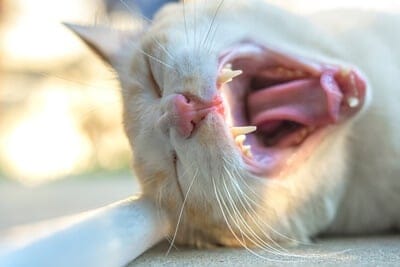Chronic bad breath (halitosis) is a common problem in cats, but it’s not normal. Many owners attribute their cat’s fishy breath to their diet and blame stinky food for it. However, diet isn’t always the explanation.
It’s normal for a cat’s breath to smell like fish if it’s just eaten fish. If the fishy or urine-like smell is chronic, it may be due to a health issue, such as periodontal disease, metabolic disease, diabetes, gingivitis, stomatitis, oral cancer, neurological disease, abscess, ulcers, or tumors.
Poor diet, excessive salivation, and foreign bodies in the mouth can lead to bad breath. Some of these problems are easy to resolve without assistance, but it’s recommended to take your cat to the vet if its breath always smells fishy.
Why Does My Cat’s Breath Smell Like Rotten Fish?
A healthy cat’s breath has a faint odor that’s largely neutral.
Any foul odor is a sign of a health issue, such as an oral hygiene problem. A fishy smell, which is quite common in cats, is usually problematic.
If your cat produces a strong and unpleasant odor, you should investigate further. According to Cornell University’s College of Veterinary Medicine, around 75% of cats aged 3 and above have dental disease.
Fishy breath could be due to harmless issues with your cat’s diet that can be easily remedied. However, it can have dire consequences if it’s due to a health problem, such as a tumor.
Here are the possible reasons for rotten-fish-smelling breath in cats:
Periodontal Disease
Odor-producing bacteria that build up in your cat’s mouth are a major cause of rotten, fishy breath.
Saliva and bacteria form a thin layer of plaque over the teeth. This layer can then mineralize and become tartar if not treated in due time.
Tartar in the mouth can lead to periodontal disease, an infection in the tissues that support the teeth.
The most prominent signs of periodontal disease are as follows:
- Excessive brownish tartar over the teeth
- Drooling
- Difficulty eating
- Favoring one side when chewing
- Inflamed gums
Poor Diet
At times, dietary issues can contribute to bad-smelling breath in the short term and long term.
Providing high-smelling foods that contain fish or liver-based ingredients can cause chronic bad breath. Fortunately, this is an easy problem to solve.
All you need to do is change your cat’s food and dietary habits. Avoid feeding smelly foods to your cat as its diet will directly impact its breath.
In the long-term, a poor diet filled with foods that aren’t easily digestible will make your cat’s breath smell like rotten fish. A healthy and nutritious diet that prevents gastrointestinal health issues will improve your cat’s breath.
Gingivitis and Stomatitis
Gingivitis and stomatitis are diseases of the mouth. Gingivitis is the inflammation of the gums, whereas stomatitis is the inflammation of the mucous linings in the mouth.
Cats are prone to developing gingivitis and stomatitis, mostly due to periodontal diseases. However, sometimes, they also develop these diseases due to bacteria, viruses, or allergens.
Only a vet will be able to determine whether your feline friend needs further testing to check for common infections, such as calicivirus and FIV.
Metabolic Disease
Often, chronic fish breath is more than just about poor dental hygiene. In some less common cases, it’s a red flag indicating much more serious conditions your cat might have, such as metabolic disease.
Metabolic diseases, like kidney diseases, are common in older cats. Kidney diseases cause toxin build-up in your cat’s blood, which leads to bad breath.
Your cat’s kidneys can get overwhelmed and lose their detoxifying capabilities. Similarly, liver diseases also cause bad breath and can leave your cat’s breath smelling like sulfur.
Diabetes
Cats with diabetes can also develop weird-smelling breath. If your cat’s breath smells fruity instead of foul, your cat may have diabetes.
With diabetes, ketones build up in the blood, making the breath smell sweeter than usual. If you notice this smell, closely observe your cat for other signs of diabetes, such as:
- Frequent urination
- Excessive thirst
- Unexpected weight loss
- Increased appetite
If you suspect your cat has diabetes, visit the vet to get a diagnosis.

Oral Cancer
In both humans and animals, oral cancer can lead to bad breath. When squamous cell carcinoma develops in your cat’s oral cavity, Oral cancer occurs.
It can develop on any soft tissue, including the tongue, gums, tonsils, and palate. Not only does oral cancer cause bad, fishy breath, but it also causes difficulty in eating.
Foreign Bodies in the Mouth
Sometimes cats chew on items they shouldn’t, such as strings, ribbons, yarn, rubber bands, bones, and even dead animals. It is common for these objects to get stuck in a cat’s mouth. These objects are called oral foreign bodies, and if they’re not removed quickly, they can contribute to bad, fishy breath.
If you see a foreign object in your cat’s mouth, don’t try to yank it out yourself. You may cause more damage, especially if the object is lodged somewhere in the gastrointestinal tract.
If you don’t get rid of foreign oral bodies, your cat may swallow them, which can lead to dangerous obstructions in your cat’s esophagus, stomach, or small and large intestines.
Neurological Disease
A cat’s cranial nerves regulate the movements of its tongue and mouth.
Any issues with the cranial nerve can affect your cat’s ability to control its tongue and open and close its mouth. This can result in hyper-salivation and significant halitosis.
In addition, if your cat’s ability to control its mouth or tongue is hampered, food and debris can collect in the mouth. Being unable to swallow or remove excess food from the mouth can contribute to fishy breath.
Excessive Salivation
Excessive salivation, also known as ptyalism or hyper-salivation, can also be the culprit behind your cat’s rotten breath. It occurs secondary to dental, neurologic, or metabolic diseases most of the time, but it can be due to severe halitosis.
During excessive drooling, dried or matted fur can collect around your cat’s mouth, and this can contribute to a bad odor. Skinfold pyodermas and other infections around the lips are common in cats with allergies.
Abscesses, Tumors, or Ulcers
Abscesses in the tooth roots, mouth structures, the nasal cavity, or areas behind the eyes can cause bad breath in cats. The same is true of tumors that develop in the same locations.
According to Chittagong Veterinary and Animal Sciences University, acanthomatous ameloblastoma, a tumor of the canine jaw, can cause excessive salivation and halitosis in cats and dogs. Similarly, ulcers caused by trauma, infections, tumors, allergies, or metabolic diseases can cause ammonia-like bad breath in cats.
How to Get Rid of Cats Bad Breath
If your cat has fishy or poop-like breath, consider scheduling professional teeth cleaning when booking an appointment with a vet.
Here are three ways to get rid of bad breath in cats:
Brush Your Cat’s Teeth Regularly
If you want your cat’s breath to smell fresh, you’ll need to regularly brush your cat’s teeth. This is a difficult task that many owners prefer to avoid, but doing that can lead to chronic bad breath.
Cats also require frequent brushing to maintain good oral hygiene. Brushing a cat’s teeth requires a lot of practice and patience, but it helps get rid of the foul smell.
Here’s how you can get started:
- Start by applying a tooth gel to your finger. You can use a cat toothbrush and cat-safe toothpaste to brush more thoroughly if your cat can tolerate it.
- Brush your cat’s teeth when your cat is usually calm and happy.
- Start slowly and build trust gradually. Allow your cat to get used to things touching its mouth.
- Use positive reinforcement throughout the teeth brushing process.

Water Additives and Cat Teeth Gels
Cat teeth gels and water additives can help you combat bad breath in cats.
You can easily add them to water or rub them on your cat’s teeth from time to time, and this will reduce the amount of plaque and tartar that builds up as film over the teeth.
Lemon Juice
Lemon juice is a natural water additive and something widely available in all households. The acidity of lemon juice can neutralize the foul smell in your cat’s breath.
To use lemon juice as a water additive, choose fresh lemon juice with no added sugars. Add a couple of drops to your cat’s water bowl. As your cat drinks lemon-added water, it’ll cure the bad, fish-like breath.
Chew Toys
Offer chew toys to your cat, as they can break down the plaque and tartar layer that develops over the teeth. Chew toys force cats to chew and gnaw, which helps keep their teeth clean.
Look for chew toys with additives for bad breath, as they’re much better than the regular ones when it comes to combating foul odor. If you can’t find one, provide a regular chew toy so your cat can gnaw on it whenever it pleases.
Bad Breath Treats
Another home remedy to get rid of foul breath in cats is to offer bad breath treats. Most pet stores sell these treats, so finding them won’t be difficult. However, these treats can be high in sugar and contain preservatives.
Bad breath treats will alleviate the bad breath only, not solve the underlying medical conditions causing bad breath.
It’s fine for a cat’s breath to smell like fish if it’s recently eaten fish, but not in other cases.

